“I’m in Pain Every Day”: For Survivors of the Beirut Explosion, It’s Still August 4
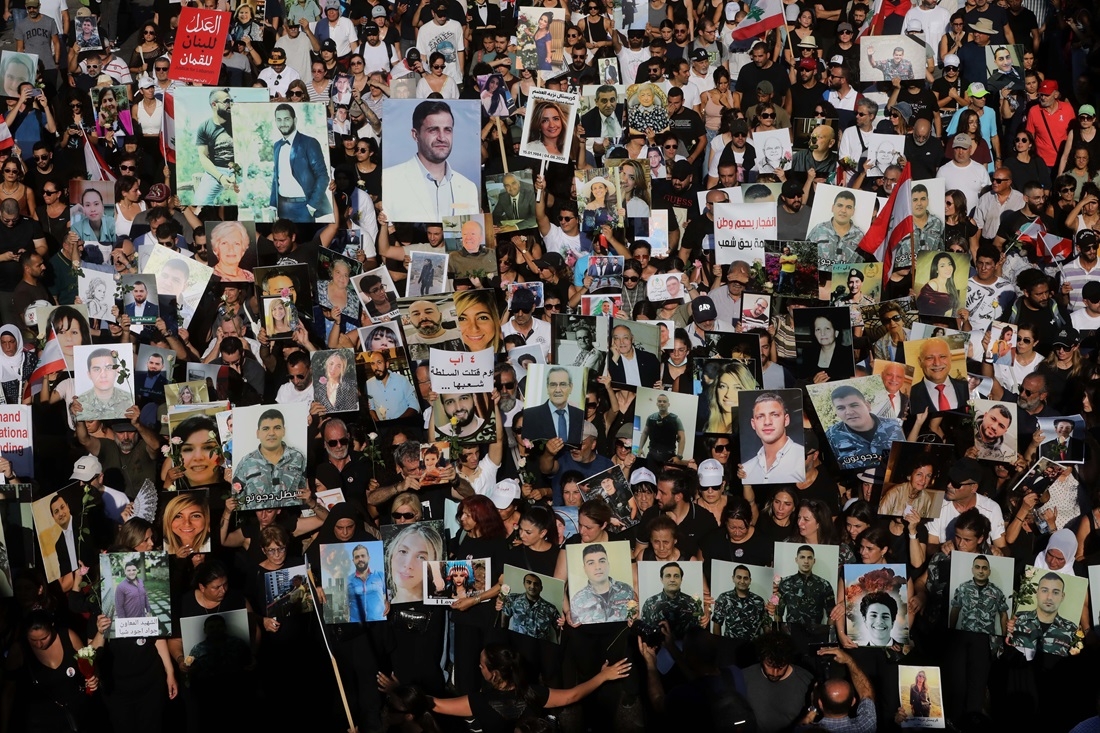
Thousands of people march on the third anniversary of the August 4 port explosion to demand justice. Beirut, Lebanon. August 4, 2023. (Marwan Tahtah/The Public Source)
Three years ago, The Public Source published an investigative feature titled, ‘“And What Would You Like Me to Do About It?”: How the Lebanese Government Disabled Hundreds of People — and Then Left Them to Pay for Its Crime’ to shed light on the people who now lived with disabilities after the August 4 port explosion, to convey their anger and frustration at having to pay to treat injuries they did not cause, and to reveal how the Lebanese state got away with all but abandoning them after promising medical coverage.
Today, on the fourth commemoration of the August 4 crime and tragedy, we revisit four individuals profiled in our investigative feature to inquire about their well-being. We learn that not a single government official or representative has paid them a visit in the past three years to do the same, and that they are still paying for follow-up medical care on their own.
“I’m Not the One Who Caused This Accident, so Why Am I Paying the Price?”: Mohammad Ali Tarshishi
Mohammad Ali Tarshishi is a 34-year-old masters student in law and social sciences at the Lebanese University in Hadath. When he isn’t studying law, Mohammad Ali does administrative work for different courts of justice. And in his free time, he runs a small side business making mouneh.
On August 4, 2020, at 6:07 pm, Mohammad Ali was getting into his car in Karantina. When the Beirut port explosion ripped through the city at 6:07 pm, a heavy object crushed his leg, rendering him unable to walk by himself. For at least six months, Mohammad Ali was bound to a wheelchair, and needed intensive physiotherapy for years after.
In 2021, Mohammad Ali told us he had a metal rod and screws in his leg that he needed to get removed around August 2022, once the bone had properly healed. Today, two years later, he says he still hasn’t done that for fear of possibly exorbitant hospital bills. Because he hasn’t been able to properly treat his leg, Mohammad Ali now suffers chronic pain in his spine.
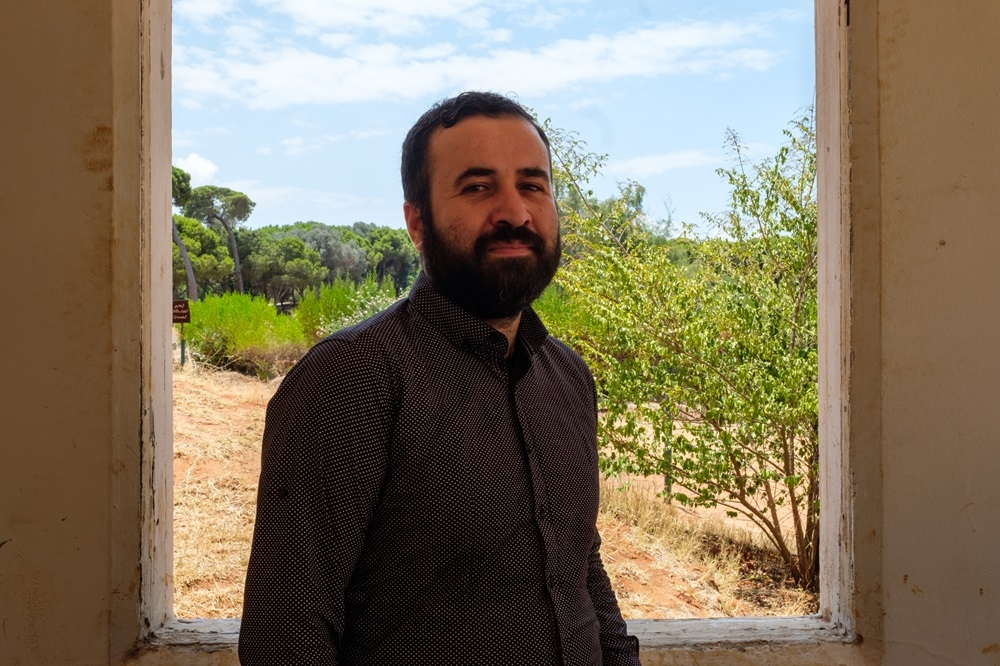
Back in 2021, Mohammad Ali had told The Public Source that he was prescribed two to three sessions of intensive physiotherapy per month for the following two to three years. At the time, the NGO Arc en Ciel was helping him cover the cost of these sessions, but he has since stopped attending physiotherapy. He says squeezing it into his busy schedule would come at the expense of his jobs and his studies, which he cannot afford. While physiotherapy brought him relief, he cannot resume his sessions without financial support, he says.
“The pain has really come back in the last six months, especially when I lie down to sleep,” he says, “I can’t sit down comfortably without lifting my leg.”
Mohammad Ali felt defeated when the explosion first happened and Lebanon’s compounding crises piled on as he had left a life abroad to settle back down in his home country.
“I’m not the one who caused this accident, so why am I paying the price? Why am I being made to suffer for it?” he says, describing his mindset three years back. “It’s torture to keep asking ourselves, ‘why did this happen to me?’ So I try my best to be headstrong.”
“All you can do is adapt to the pain. And this pain isn’t going anywhere.”
Ultimately, Mohammad Ali found solace in his studies, and a renewed determination to complete them. His main motivation was a sense of duty to defend those who were wronged on August 4, including himself. The way to do that, he found, was to familiarize himself with the Lebanese justice system, and the state’s broken relationship with its people.
“My studies were my only hope; they were the only thing that pushed me forward,” he explains. “I needed to determine exactly what the state’s duties to its people were, what my role and duties were, what I deserve from the state; so that I could see where the cracks and flaws were, and either punish or correct them.”
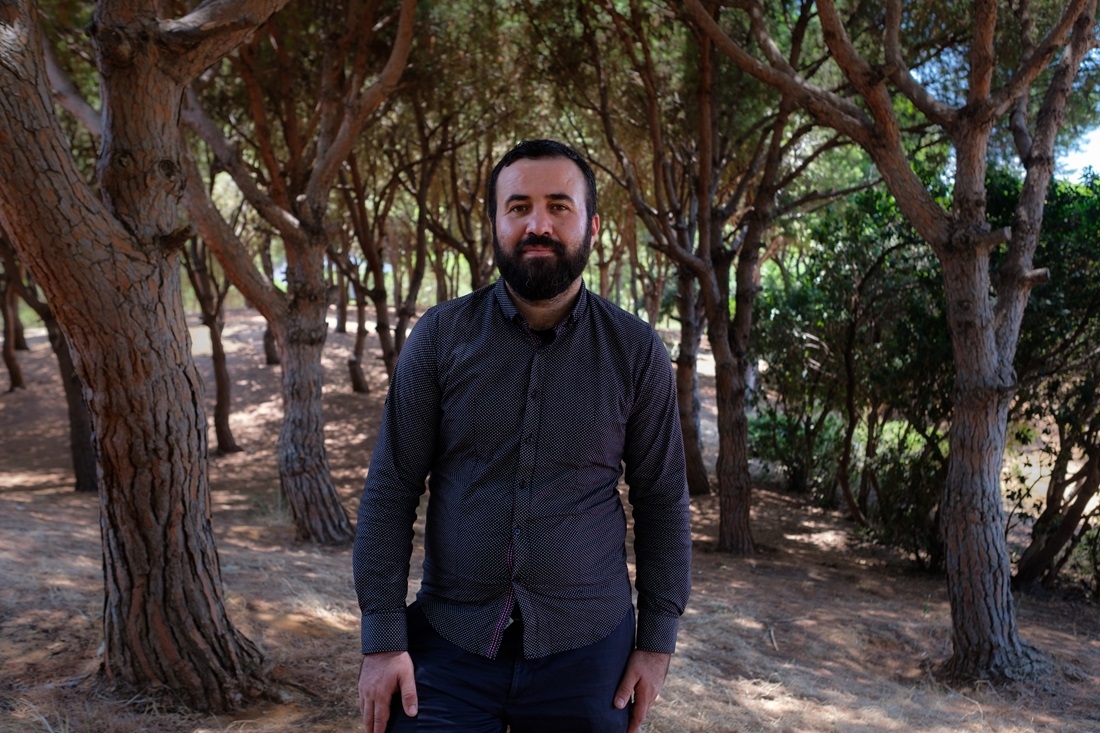
Before August 4, 2020, Mohammad Ali had dreams of exporting his mouneh to Europe — but the blast crushed those dreams when it shattered his machines and equipment. He has since tried to make mouneh again, but has had to restrict production to a much smaller scale. Electricity shortages and expenses stood in the way of appropriate cooling, which is necessary to preserve his products and maintain his reputation. Ultimately, costs overshadowed any sort of profit and his small business just wasn’t sustainable.
“You reach a point where you’re selling to cover the rent of the place, production costs, the rent of your house, and you reach a point where you have to hold off on covering one of these things, so that you can pay for machine repairs,” he says. “It was so hard.”
On top of that, he says, some people have yet to pay him for the goods he provides them because they aren’t able to. “If someone comes to me and says they’re hungry, how can I turn them away?”
“I believe the world is a beautiful place when we live and lead with our humanity and love. We’re all going into the ground and we’re not taking anything with us when we go.”
Mohammad Ali dreams of getting a PhD in law and going back to teaching, like he used to when he lived abroad. But he also hopes to re-establish his mouneh business — this time on a larger scale, the way it was before the explosion.
“I’m not the one who caused this accident, so why am I paying the price? Why am I being made to suffer for it?” —Mohammad Ali Tarshishi
As for his expectations from the state, he believes that the government should be covering everyone’s healthcare. “That’s a necessity; it is the highest priority” he says, looking back at everything he has lost. “While we are no longer able to demand electricity and other things, healthcare should be a given at the very least.”
“I’m not going to hold onto hope [that we’ll get anything from the state]. We’re tired,” he says. “I’m determined to make the state work in my best interest, and not the other way around.”
“There’s Always a Part of You That’s Missing”: Mirna Habbouche
Growing up, Mirna Habbouche was bullied by the other kids at school because her father wore sunglasses all the time — even indoors. What they didn’t — and couldn’t — know was the dark reason behind it: Mirna’s father had lost his eye in combat in the army at just 32 years old.
In a sick twist of fate, on August 4, 2020, when Mirna was driving past the port in Karantina with her son Chris, she, too, was injured in that day’s tragic explosion and lost vision in her right eye. She was 36 at the time. One of Mirna’s biggest fears now is for Chris to face the same mockery from his peers because of her injury.
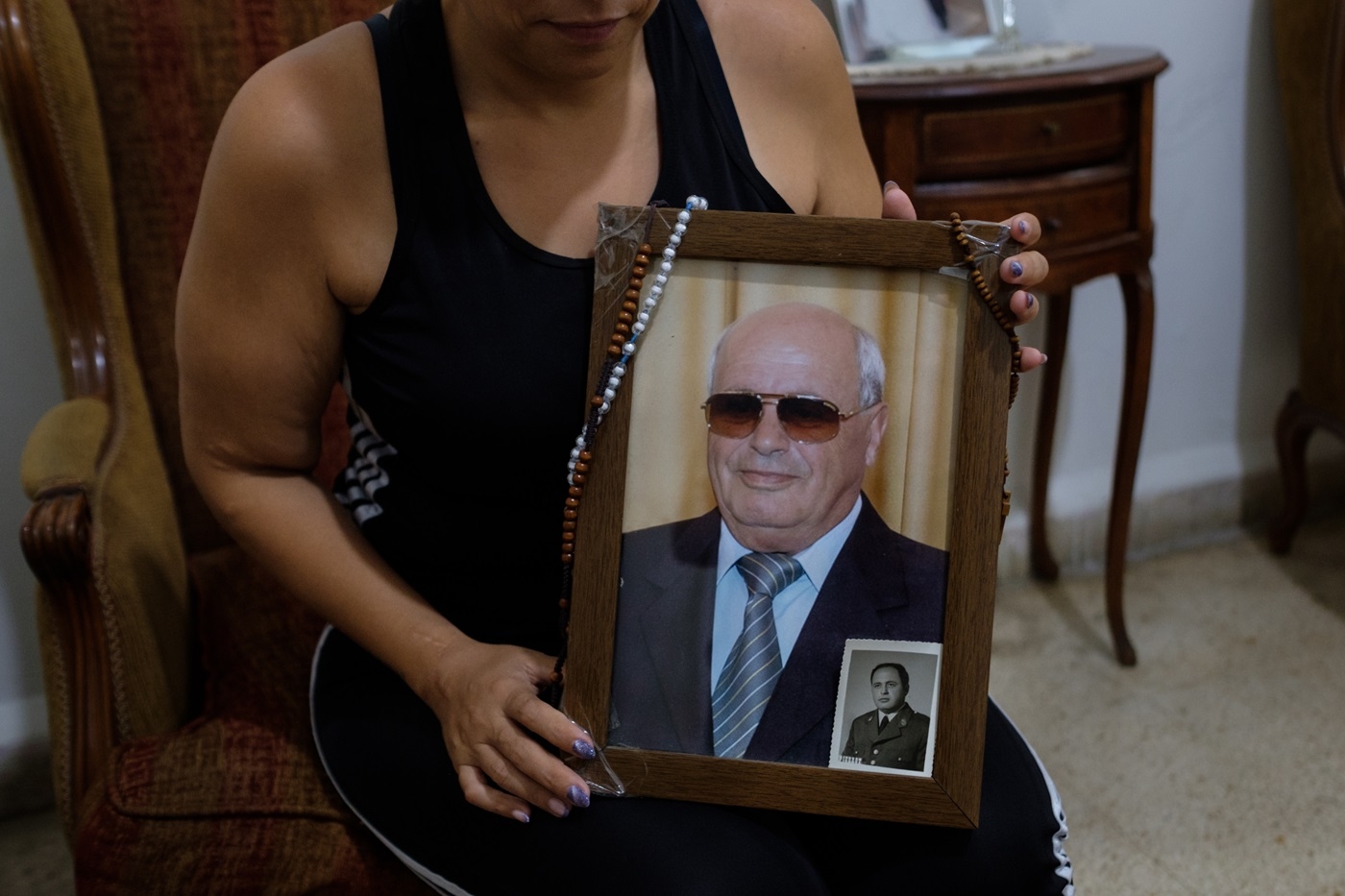
Today, Mirna is 40 years old and works two jobs: she is an accountant in the morning, and a school teacher in the afternoon.
“I grew up with a father who had one eye. But my dad was a hard worker, and he really struggled to get us where we are today,” she says. “He worked hard and tired himself, and he didn’t let his injury get in his way. He set an example for me.”
What Mirna is truly passionate about is teaching. She’s been doing it since 2002, even while she was at university, and afterwards always while also working another job.
“If I want to submit a report it won’t take me the usual five minutes to do it; it’ll take me one to two hours. I have to repeat my work two to three times to make sure I haven’t made any mistakes. If I were working anywhere else, [instead of with my brother-in-law], he probably would have fired me a long time ago.”
“I was working with some kids at this Armenian school, focused on mindset and facing situations outside of your comfort zone,” she explained. “And this is exactly my story. I have been treated by specialists [to no avail], but I didn’t let this injury control me; I control it.”
Mirna has had to have six surgeries since August 2020: first on her eye, then on her arm (which was lacerated with shards of glass), in addition to the stitches in her eye, two cornea transplants, and a lens replacement.
“And now on the 5th of August, I have another surgery. I have to take the lens out because this cornea is dead.”
In May 2021, Mirna paid $2,000 out of pocket for the cornea itself, and L.L. 5 million for the surgery. She says the National Social Security Fund covered her hospitalization for only two days.
Six months after her cornea transplant, in November 2021, when Mirna was changing Chris’ diaper, the electricity cut and she stumbled into a shelf and hit her eye. One hot night shortly after, she slept and woke up to a red eye. Mirna went straight to the ER and spent nearly all day there before receiving a diagnosis: the cornea was slowly dying after she hit her eye on that shelf, and it was already 50 percent dead. She went into surgery the very same day.
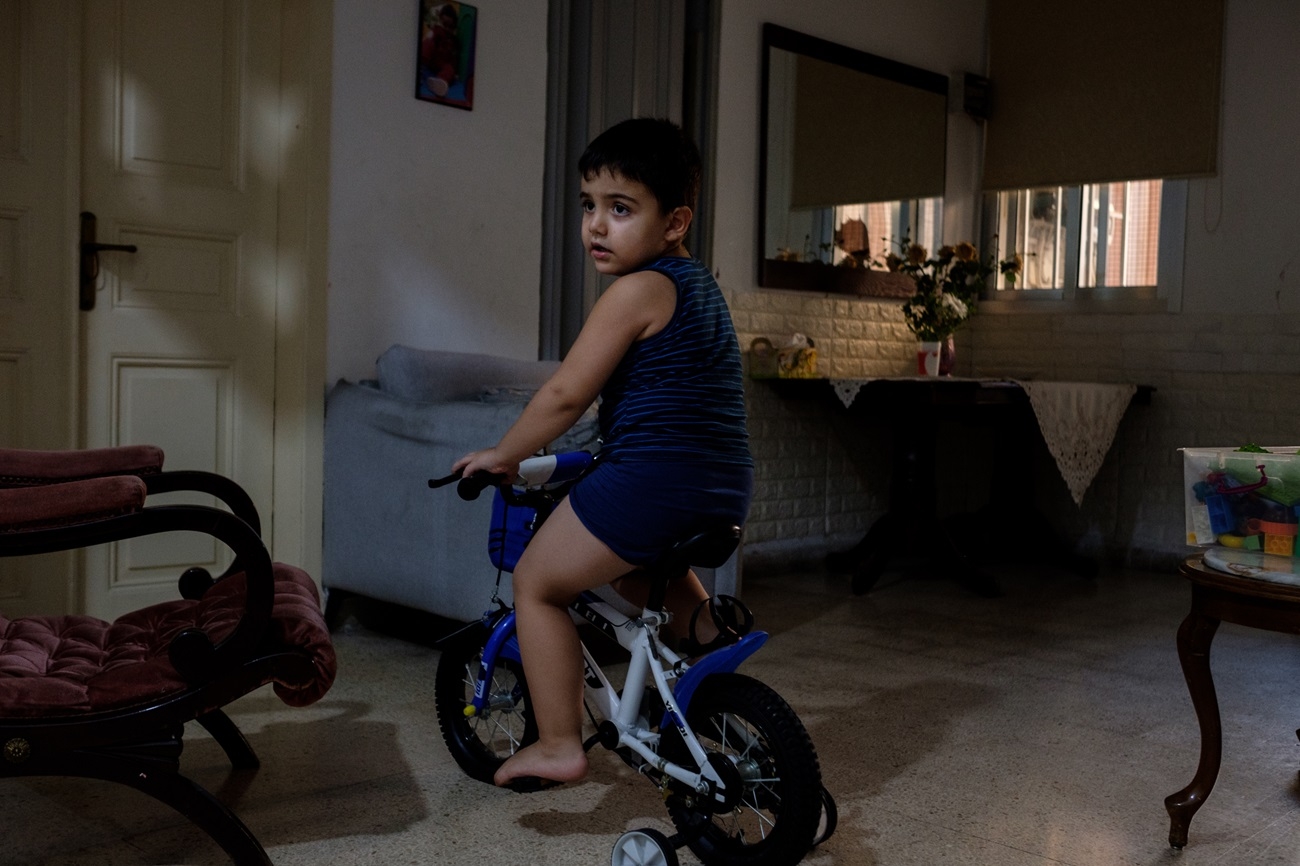
Today, a cornea costs $3,500 — almost double what it did three years ago, and Mirna says it has to be special-ordered every time, with the possibility of waiting months to get it as there is a long wait list. There is also the risk that her body will reject it.
So far, despite all of the surgeries and treatments Mirna has had on her right eye, she says she has absolutely no vision in it. “There’s nothing in the right eye.”
“I’ve done the cornea transplant twice,” she says, humorously, “and hopefully the third time’s the charm!”
Despite her light-spirited demeanor and her charming humor, Mirna’s day-to-day struggles and frustrations are not for the faint of heart.
“There’s only so much you can adapt to, and trying to get through daily life proves that.”
Mirna describes how she has accidentally knocked her son over, who would then hit his head because she couldn’t see him standing to her right; or how she has closed the car door on his little hand because she couldn’t see where his fingers were.
“As a mother, can you imagine how heavily you would blame and punish yourself for that?”
The port explosion flipped Mirna’s life upside down. She says she used to be much more independent, and would go on drives even in the middle of the night. She could cook for herself and take care of her son without anyone’s help. Today, Mirna is afraid to drive alone. Even dicing tomatoes strains her arm, and she usually needs her mother or sister to step in.
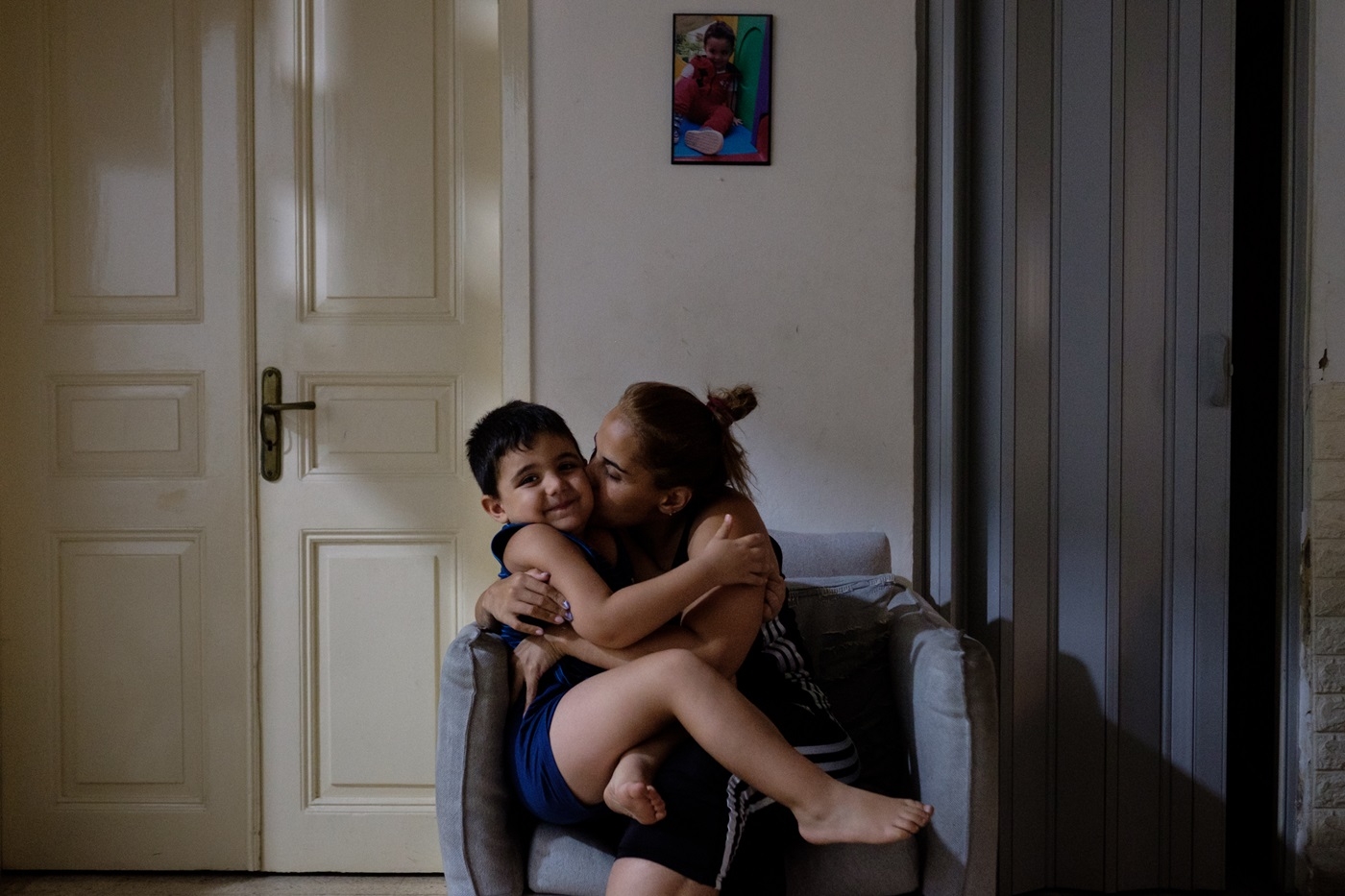
“Do you know how many car accidents I’ve gotten into? There are things I used to do that I just don’t anymore. I don’t go to the beach anymore, I’m afraid of the water,” she says. “I envied my sister for the first two years because I wasn’t allowed to go swimming in the pool. I envied my family because they were playing with Chris in the water. I envied her, I told her she was lucky. ‘This is the time when I should be enjoying my son, and you’re the one doing it.’”
“You feel like there’s always a part of you that’s missing,” she tells The Public Source. “I dream of going back to the way I was. It’s hard to live at someone else’s mercy. Wouldn’t all of this anger you, too?”
This last cornea transplant is the final surgery she will have to do for her eye, for now. But Mirna is not holding out hope that her situation will change.
“The only hope I have is that, instead of the blackness, I will begin to see white. And maybe a little bit of blurriness.”
She says there is no hope for her injured arm either, which has not properly healed since the explosion. The countless shards of glass in her arm still prick and bother her; she still pulls them out every now and then. She had to quit physiotherapy due its burdensome cost: between $20 to $35 a session, despite her need for an unlimited number of additional sessions.
“The doctor told me I have to accept my arm the way it is. I can do a risky surgery that will either save it or I’ll completely lose it. I wasn’t willing to take that chance.”
“You feel like there’s always a part of you that’s missing. I dream of going back to the way I was. It’s hard to live at someone else’s mercy. Wouldn’t all of this anger you, too?” —Mirna Habbouche
Mirna says for one year after the blast, consultations with her doctor were free. But then, he started charging $20 to $25 per consultation — $60 to $70 now, she says — with every stitch removal costing an extra $10. She still has 12 stitches left that she is neglecting simply because she can’t afford it.
In a strange turn of events, during the week of July 8, 2024, Mirna received a phone call from the Ministry of Public Health, asking her if a representative could visit her home that Friday. She was surprised — for the last four years, no one from the government has ever inquired about her or her injuries. Mirna said yes. And when the Ministry representative visited her that Friday, she found that the Ministry was “just double-checking information” — the representative questioned whether or not her injuries were caused by the port explosion, and if she has the evidence to back it up.
“It was the only time I received a follow-up visit.”
“I Only See White”: Elie
Elie is a 48-year-old soldier in the Lebanese army (he has asked to remain anonymous for fear of repercussions), who, like Mirna, lost his eyesight in his right eye in the Beirut port explosion.
Elie and Mirna are lifelong friends. Elie was an old friend of Mirna’s father; they would go hunting together, and at times, Elie would visit their home and have a cup of coffee and chat with Mirna.
“He’s my rock,” Mirna says about Elie, when we sat down with both of them.
When the explosion tore through Beirut, Elie was the one who took Chris from Mirna and sped off with him to a hospital nearby to make sure he was fine — despite his own injuries. Elie loves Chris as if he were one of his own.
“Chris is almost five. If his mom or dad yell at him, he’ll come hide behind me,” he says. “He knows I’ll keep him safe.”
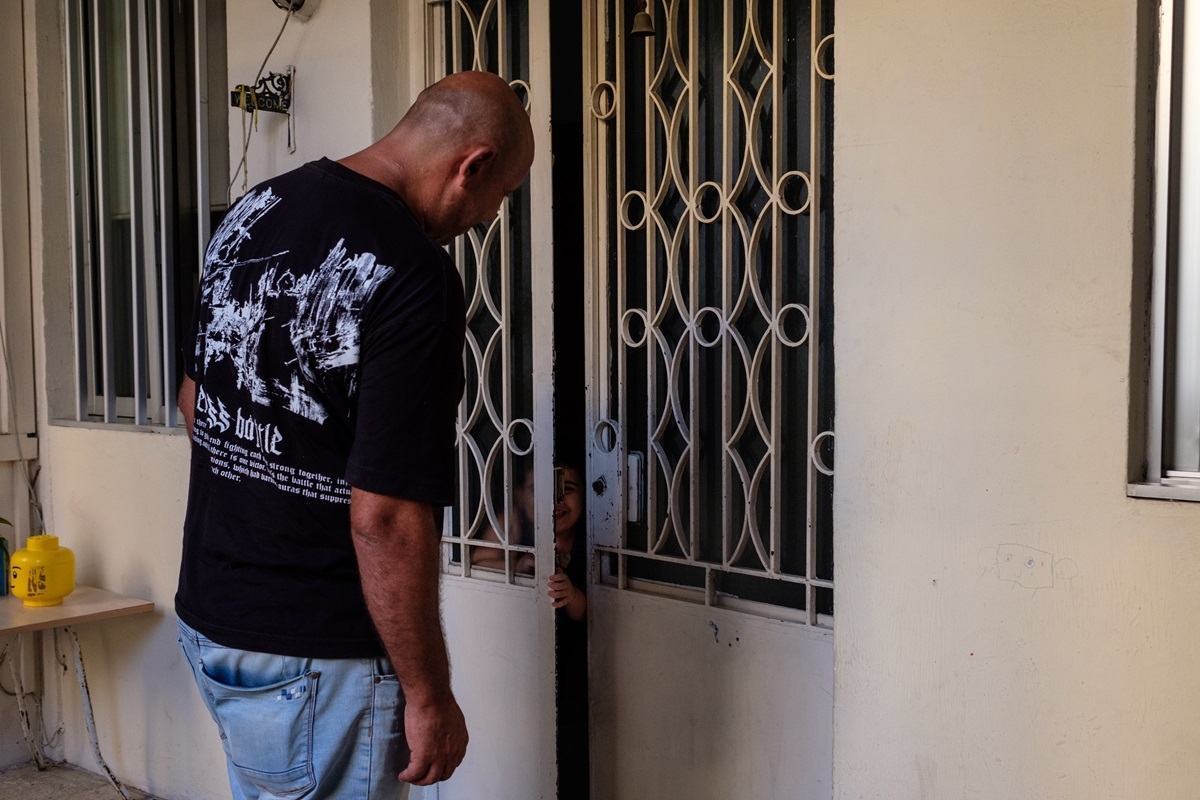
Like Mirna, Elie can no longer see in his right eye, but has stopped all of the necessary treatments because he cannot afford to pay even one more lira.
“The army covers a little bit and I’m having to pay what’s left, in dollars. I’ve paid $15,000 for everything I’ve done for my eyesight so far,” he explains. “I had two more surgeries, and that’s where I stopped. I told them I can’t pay for it.”
Elie’s doctor told him the last surgery he did — a year and a half ago — should have had a 100 percent success rate, especially considering that the infrastructure of Elie’s right eye remains intact.
“But nothing changed. It didn’t get any better,” he says. “I only see white.”
Elie has had to develop a mindset not to expect any good news.
All in all, he has had to undergo five surgeries since 2020. His first surgery, immediately after the explosion, was fully covered by the army. The second surgery he did was for the retina and lens, and cost him $5,000, and that was only the difference he had to pay with the army’s standard coverage. After that, he did a cornea transplant, another surgery on his eye, he had stitches removed, and now, he says, he has two surgeries remaining.
He says the fluid in his right eye has dried up, and is no longer capable of producing tears, because the blood vessel was detached in the explosion. His two remaining surgeries would have replaced the fluid in his eye and fixed an injury further inside the eye.
The blast also left Elie needing 180 stitches in his face and head because of small shards of glass shrapnel. “If I show you a photo, you wouldn’t believe that this is a human being. I used to go to the doctor every single week and he would pull glass out of my face and clean my wounds.”
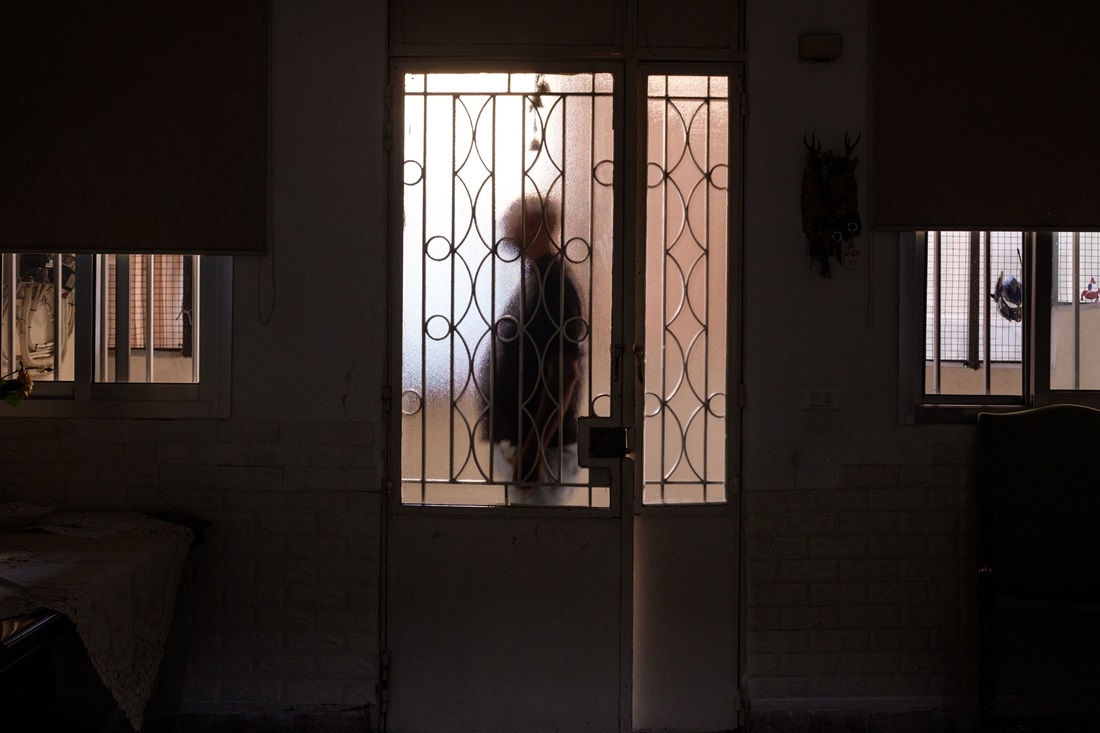
Like everyone else, despite the severe extent of his injuries, Elie was not visited by or checked on by anyone from the government. “Not even the army,” he says, incredulously.
Elie says, in fact, that most people turned him away when he needed to fund his medical costs as soon as they found out he was in the army, and that his sister in Australia was the person who helped him the most on the financial front.
Today, he makes $280 to $300 a month from his job in the army, all while trying to support his 18-year-old daughter and her dream of becoming a beautician. Elie has had to take on other odd jobs in order to make ends meet and give her the life he wishes he had. “I just think about our children and hope their lives are better than ours; we didn’t get to live much of ours,” he says, in reference to Lebanon’s myriad crises over the decades. Once she receives her certification, Elie’s daughter is hoping to live with his sister in Australia, who would like to open up a salon for her, so that she doesn’t have to worry about additional costs.
When describing his everyday life, he details the difficulties he found returning to things that were once normal — innate, even.
“In the beginning, you walk around like you’re drunk. You have no sense of balance. When I would drive, I’d hit other people’s mirrors,” Elie explains. “It bothered me a lot for the first two or three months.” He says he has adapted since then; he drives normally now — but struggles with tight roads.
“If I show you a photo, you wouldn’t believe that this is a human being. I used to go to the doctor every single week and he would pull glass out of my face and clean my wounds.” —Elie
Elie says he’s no longer really living for himself, or putting himself first, as his daughter is his biggest priority. Constantly in survival mode, he lives one day at a time.
“I had dreams like everyone else,” Elie says. “I wanted to leave the army and build a house to live in with my daughter. Then the crisis came, and my end of service indemnity went from $200,000 to $3,000.”
Today, Elie says he has the same dreams as anyone else: “I don’t want to have to depend on anyone. I didn’t have to for my whole life, until this injury.”
“God Brought Me Back for My Girls’ Sake”: Fatima Qiryani
Fatima Qiryani is a 41-year-old mother of 15-year-old twin girls, who she says are the reason she is still alive today. She works at a men’s clothing store around the corner from her parents’ home, where she lives with her daughters. Their father is out of the picture, so Fatima has provided for them with the support of her family for the last 12 years.
“I believe God brought me back for my girls’ sake,” she says, recalling that fateful day.
Fatima was at work in her neighborhood when the explosion devastated Beirut on August 4, 2020. The blast shattered her skull, leaving her in need of critical surgery; it injured her face and mouth, and bent a bone in her leg, causing nerve damage. She was in a medically-induced coma for 18 days.
“When I woke up in the hospital, I had no idea where I was or what to expect. The hardest thing I’ve faced in my life so far was when I first looked in the mirror,” Fatima says, tearfully recalling her first encounter with herself after the explosion. “I took in what I saw: I was missing a part of my skull. Some of my hair was gone. My eye was swollen. I was swollen everywhere. I didn’t recognize myself. I started to cry.”
Fatima and her sister Darein say the Ministry of Social Affairs initially stepped in to cover her very first surgery to replace the missing piece of her skull, but she has had to pay out of pocket for everything since and that includes five other surgeries, monthly consultations with doctors, regular scans and tests, all kinds of medication, and intensive physiotherapy.
“When I last went to my doctor and did a scan for my head, he said to me, ‘Fatima, you have so many scans now! You should frame them.’” That recollection makes her laugh.
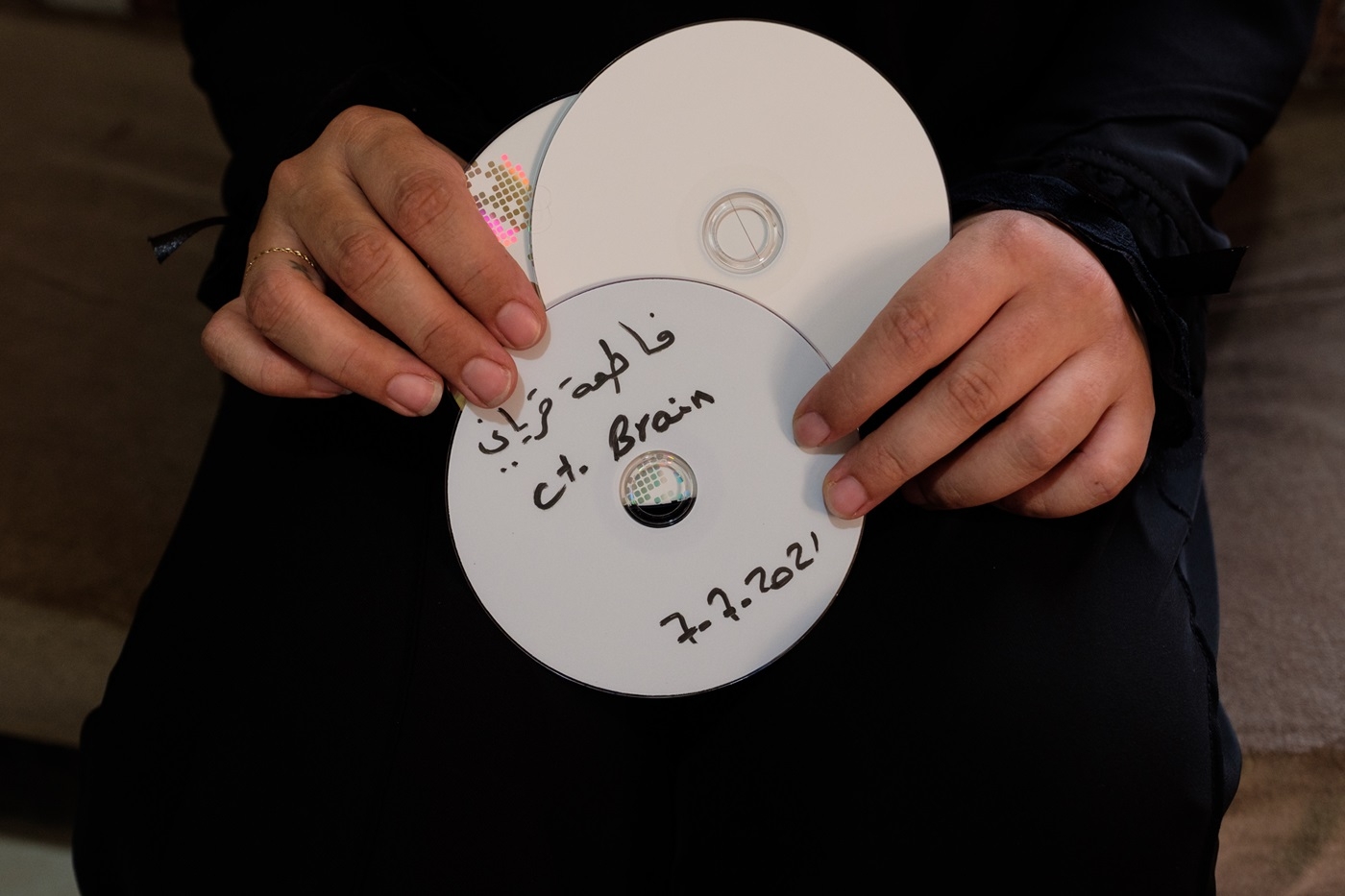
Fatima says Darein left no stone unturned, as she reached out to different organizations and ministries — who were bound by law to offer financial assistance — in vain.
“The state had said they would do all of that, but nothing came out of it. It was all lies,” she told The Public Source. “All the costs were on us. It was all on us and it’s still on us. No one looked our way.”
She says that some of her doctors feel for her and don’t make her pay for consultations, while others charge between $50 and $60. And the price of medication only makes her financial predicament worse.
After the explosion, Fatima and Darein went to the Ministry of Social Affairs to try to get Fatima a disability card, which, in theory, would grant her all the rights under Law 220/2000, but the Ministry stalled and stalled, and ultimately did not follow up. Fatima says this card would have done little for her anyway, and instead, calls for a card specifically for people with injuries from the explosion, to support them financially and cover the cost of medication. “That way, when you go to the doctor, you can rest assured that you’re covered.”
“I hope God tries [the people in the government] the same way, so that they can get a taste of what we’re living through. Anyone who says the state is helping us is a liar.”
When we spoke to Fatima on July 25, almost four years after the Beirut port explosion, she was waiting to find out if her leg surgery scheduled for the beginning of August was postponed. This would be the last surgery, she says, calling it “the greatest blessing.”
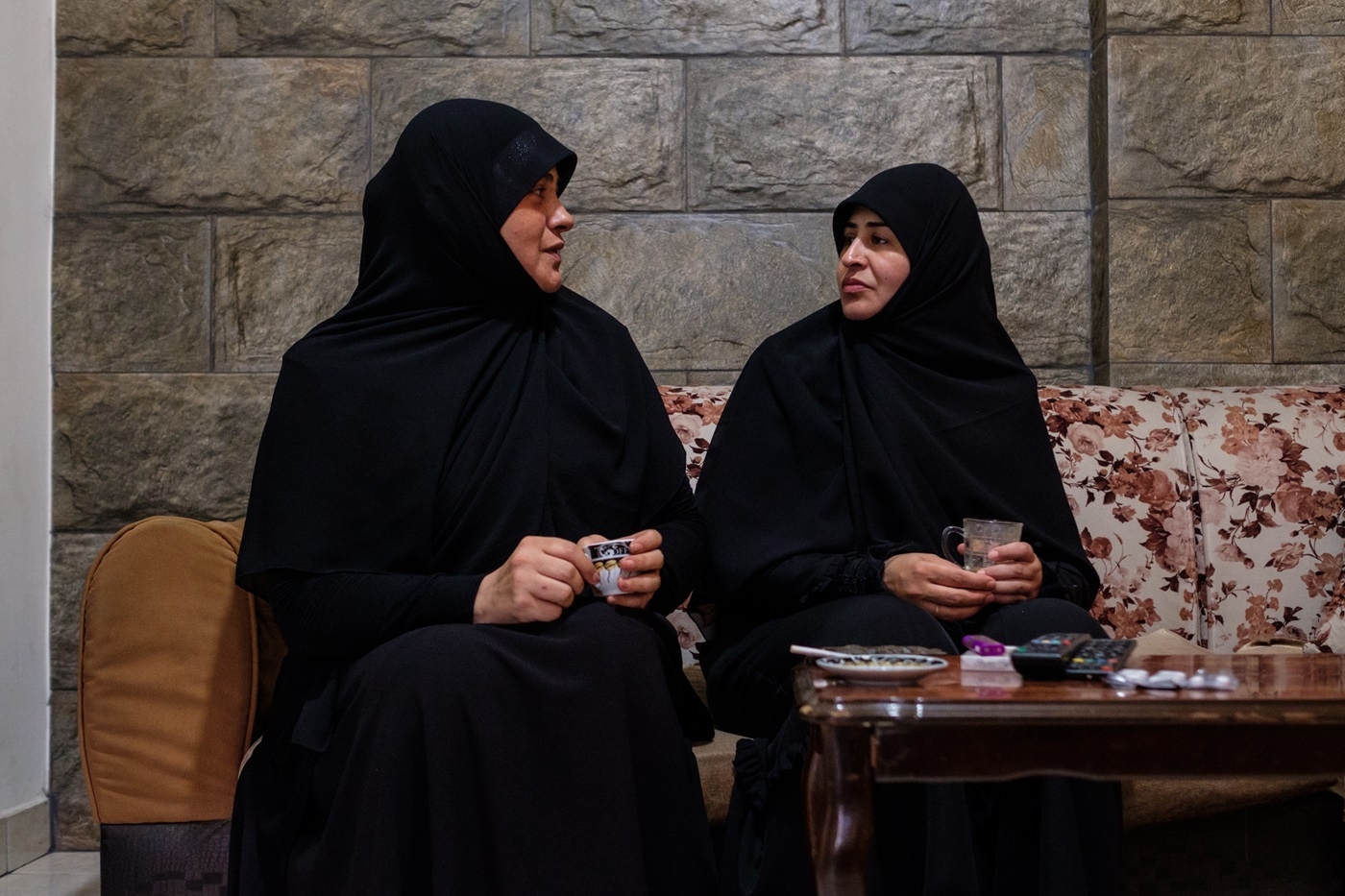
Even after all of her treatment and physiotherapy, she still can’t walk much because it eventually causes her too much pain.
“I can’t afford physiotherapy anymore, it’s too expensive. I feel more comfortable at the gym, and it’s spacious there, but I can’t do it every single day,” she tells The Public Source, explaining that she uses the exercise bike for her nerves, and for just 30 minutes, never longer, out of fear of anything happening to her head.
When we spoke to her in 2021, Fatima still required intensive dental surgery to restore her ability to eat and drink. She has since gotten that surgery — paid for entirely out of pocket, of course — and says that, while she can eat and drink properly again, she now has issues with her gums, another unnecessary obstacle to ease everyday living.
“The state had said they would do all of that, but nothing came out of it. It was all lies. All the costs were on us. It was all on us and it’s still on us. No one looked our way.” —Fatima Qiryani
Everything in her life has changed. She says the doctor warned her that her head injury is critical, so now Fatima lives in perpetual fear of everything around her. She can no longer move around freely because she fears falling or hitting her head in an accident.
“I don’t have the privilege to live like everyone else. I’m constantly worried about what could happen. This is my life now,” she says, describing her new normal. “I’m in pain every day, I struggle every day. I feel like I’m not really alive, I’m just living.”
She also says that she has struggled to sleep every single night for the last four years. She gets two hours of sleep a night, if even that. And despite seeing a doctor and taking the prescribed medications, nothing has worked.
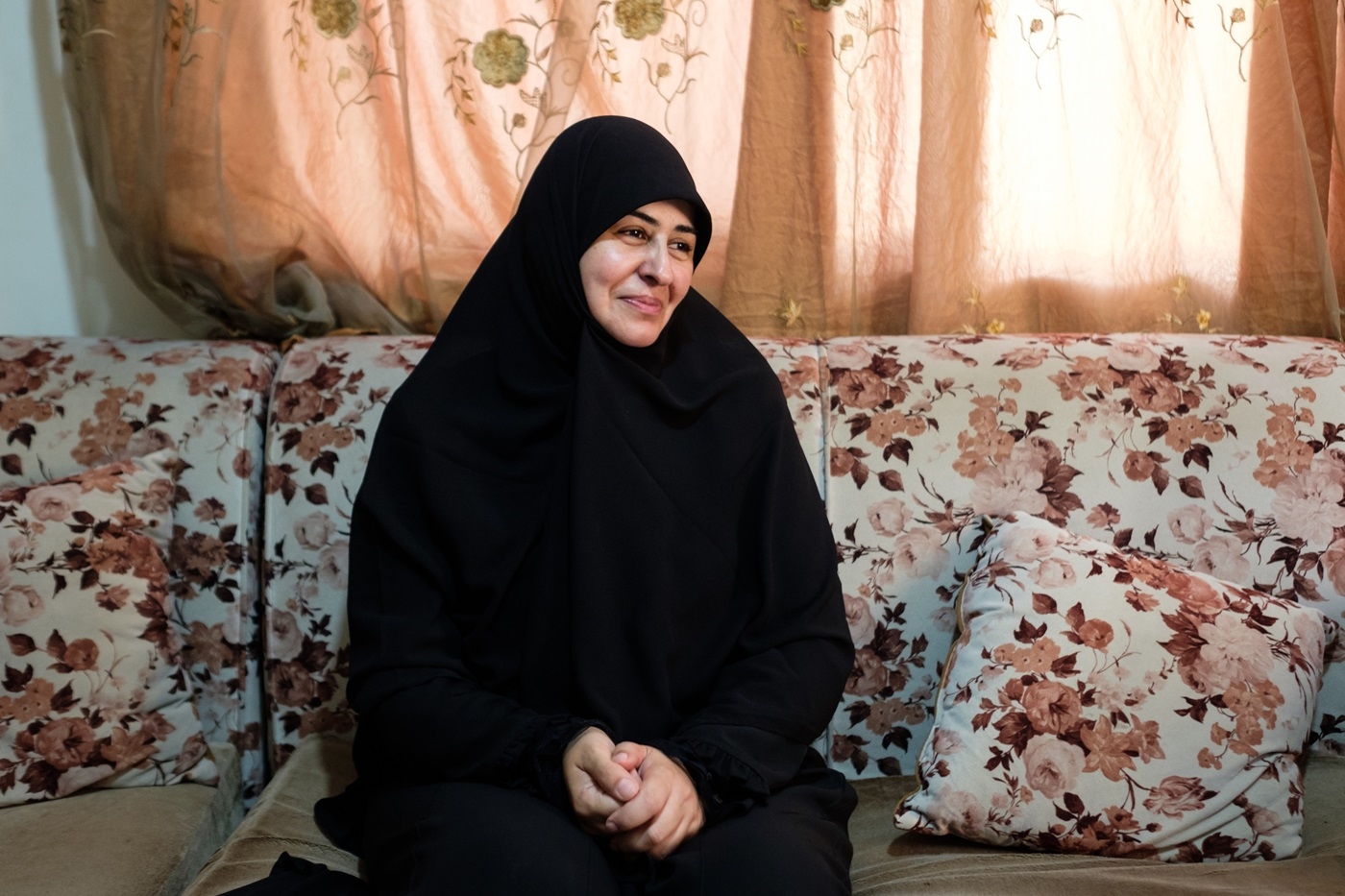
Fatima puts on a brave face in front of her daughters. They’d been at boarding school since they were three, until last year; it was easier for Fatima to hide her struggles from them when they were away.
“There’s a side to me that I don’t let my daughters see,” she says. “When I’m in pain or upset, I don’t come home. I’ll go to a friend’s place instead so they don’t have to see me like that.”
Fatima dreams of having a place of her own, where she can live alone with her girls. “And I can raise them and support their education all on my own, because I really don’t like being a burden on anyone,” she says. “But this is just a dream. There’s no solution.”